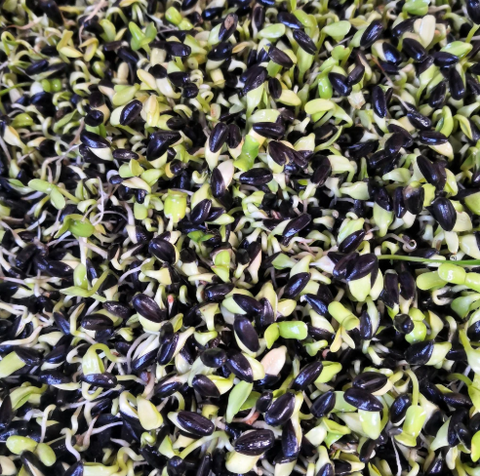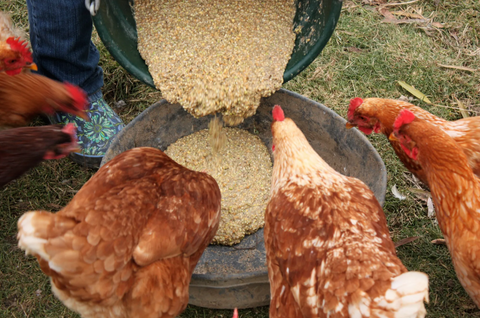Sprouting Sunflower Seeds for Chickens: A Supercharged Snack for Your Flock 🌱🐓
Looking for a healthy, budget-friendly, and easy way to boost your flock’s nutrition? Say hello to sprouted sunflower seeds!
Sprouting is one of the simplest ways to unlock more nutrients from the food you already have. It turns regular seeds into a fresh, living food packed with vitamins, enzymes, and protein—perfect for supporting strong, happy, and productive chickens.
In this post, we’ll show you how to sprout sunflower seeds for your flock and explain all the amazing benefits they offer.
🌻 Why Sunflower Seeds?
Sunflower seeds—especially Black Oil Sunflower Seeds (BOSS)—are a favourite among chicken keepers for good reason:
-
High in protein, perfect for growth and feather development
-
Rich in healthy fats, giving birds extra energy
-
Packed with vitamin E, selenium, and B-complex vitamins
-
Great for feather quality and egg production
But when you sprout them, you take all those benefits to the next level.
🌱 Benefits of Sprouted Sunflower Seeds for Chickens
Sprouting seeds triggers the natural process of germination, which causes the seed to release stored nutrients and become more digestible. Here’s what that means for your chooks:
1. Higher Nutrient Value
Sprouting increases the availability of vitamins, especially B vitamins, vitamin C, and vitamin E. It also boosts amino acids, which are vital for feather regrowth during molting.
2. Better Digestibility
As the seed sprouts, complex starches and proteins begin to break down. This makes them easier to digest, so your chickens absorb more nutrients with less effort.
3. Natural Enzymes
Sprouts contain live enzymes that support digestion and gut health—especially beneficial for younger chicks or hens under stress.
4. Hydration Boost
Sprouts contain more moisture than dry feed or seeds, helping keep your flock hydrated, especially during warmer months.
5. Enrichment and Variety
Giving your chickens fresh sprouts adds texture and variety to their diet, which supports natural pecking behavior and reduces boredom in the run.
🛠 How to Sprout Sunflower Seeds for Your Chickens
Sprouting is super simple and requires no special equipment.
What You’ll Need:
-
Raw, unsalted, unroasted sunflower seeds (preferably Black Oil Sunflower Seeds)
-
A clean jar, tray, or sprouting container
-
Clean, non-chlorinated water
-
A breathable cover (mesh, cheesecloth, or towel)
Step-by-Step Instructions:
1. Rinse the seeds:
Give your seeds a good rinse to remove any dust or debris.
2. Soak the seeds:
Place them in a jar or bowl and cover with water. Let them soak for 8–12 hours.
3. Drain and rinse:
Drain off the water and rinse the seeds. Leave them in the container and cover with a breathable lid or cloth.
4. Rinse twice daily:
Rinse and drain the seeds every 12 hours to keep them moist and fresh. Be sure they’re not sitting in water between rinses.
5. Wait for sprouting:
In 2–3 days, you’ll see little white tails emerging—this means they’ve sprouted and are ready to feed!
🐓 Feeding Sprouted Sunflower Seeds
-
Offer sprouts in small amounts as a supplement or treat, not a full meal.
-
Scatter them in the run for natural foraging fun or add to their feed trough.
-
Feed just enough for them to finish within an hour or two to avoid spoilage.
-
Store extra sprouts in the fridge for up to 2–3 days.
✨ Tip: You can also sprout other seeds like wheat, barley, mung beans, or peas and mix them with sunflower sprouts for added variety!
🚫 A Few Cautions
-
Don’t use seeds that are salted, roasted, or treated for planting (they may contain chemicals).
-
If your sprouts develop a bad smell, sliminess, or mold, discard them immediately.
-
Always rinse thoroughly and maintain cleanliness to avoid bacterial growth.
💬 Final Thoughts
Sprouting sunflower seeds is a simple and affordable way to add fresh, living nutrition to your chickens’ diet. It’s especially helpful during winter, molting, or times when fresh greens are hard to come by.
Plus, it’s fun to grow them—and even more fun to watch your flock enjoy them!
Have you tried sprouting seeds for your flock? Let us know your favorite combinations or tips in the comments below!
🧡
Happy sprouting,
– The Chook Manor Team




